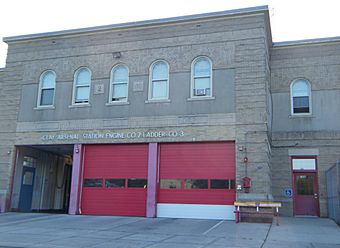Engine Company 2 Fire Station facts for kids
Quick facts for kids |
|
|
Engine Company 2 Fire Station
|
|

East elevation, 2010
|
|
| Location | Hartford, CT |
|---|---|
| Area | 1,600 square feet (150 m2) |
| Built | 1910 |
| Architect | Russell F. Barker |
| Architectural style | Renaissance, Italian Renaissance |
| MPS | Firehouses of Hartford MPS |
| NRHP reference No. | 89000022 |
| Added to NRHP | March 2, 1989 |
The Engine Company 2 Fire Station is a historic firehouse in Hartford, United States. It stands at the corner of Main and Belden streets. This brick building was constructed in the early 1900s. It was the second fire station built for this specific fire company.
The architect, Russell Barker, designed many public buildings in Hartford. He chose an Italian Renaissance Revival style for this firehouse. This was an unusual choice for a fire station at the time. The front of the building has detailed brickwork. It is one of only two firehouses left in the city that were built for both firefighters and their horses. In 1989, it was added to the National Register of Historic Places. Today, it still works as a fire station for Engine Company 2 of the Hartford Fire Department.
Contents
About the Fire Station Building
The fire station is located in the Clay–Arsenal neighborhood. This area is just north of downtown Hartford. It sits on the southwest corner of Main and Belden streets. This part of Clay-Arsenal connects the busy downtown area to quieter residential neighborhoods.
Outside the Fire Station
The building has two stories. It is made of brick. The front (east side) is covered in beige brick. The other three sides are red brick. The corners of the building have special brick patterns that look like decorative stone blocks.
On the ground floor, there are three large garage doors. These are where the fire trucks are kept. Above these doors, metal letters spell out "CLAY-ARSENAL STATION ENGINE CO. 2 LADDER CO. 3". Above these letters, you can see stone blocks carved with "HFD", "FIRE", and "DEPT."
The second floor has five round-arched windows. Next to the middle window, there are stone panels. One panel has the number "2" and the other has "1910". These numbers likely show the engine company number and the year the building was built. The roof is mostly flat, but the front section has a sloped, hipped roof.
Inside the Fire Station
Many original features are still inside the fire station. The main room where the fire trucks are parked has wood panels on the lower part of the walls. There are also semicircular openings in the walls. These openings once held the sliding poles that firefighters used to quickly get downstairs.
At the back of the building, there used to be a row of large doors. These doors led to the stables where the horses were kept. Another set of doors on the south side opened into the room where horse harnesses were stored.
Two other rooms behind the stables were also used for horses. One of these rooms still has the iron hitching posts and original wood floor. The other room has been changed into a kitchen.
On the second floor, most of the original wood trim around windows and doors is still there. Double wooden doors once covered the top of the sliding poles. There is also a large, unfinished room above where the stables used to be. This room was once the hayloft, where hay for the horses was stored.
History of Engine Company 2
Engine Company 2 was started in 1864. At that time, the city of Hartford decided to combine its volunteer fire companies into one paid city fire department. Engine Company 2 was originally known as the Neptune company. Their first firehouse was located nearby on Main Street. They used that building for the rest of the 1800s.
In 1910, the city decided to build a new firehouse for the company. Russell Barker was chosen as the architect. He had started as a draftsman and did not have formal training. This firehouse was the first of many buildings he designed in Hartford until 1930. These included five schools.
Barker's design used the Italian Renaissance Revival style. This style was not common for fire stations. The building was designed to house both firefighters and their horses. This shows a time when the fire department used its own horses before switching to motorized vehicles. This firehouse and the Engine Company 4 building are the only two left in Hartford that were designed for both men and horses.



